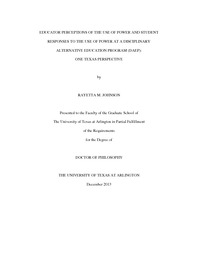
ATTENTION: The works hosted here are being migrated to a new repository that will consolidate resources, improve discoverability, and better show UTA's research impact on the global community. We will update authors as the migration progresses. Please see MavMatrix for more information.
Show simple item record
| dc.contributor.author | Johnson, Rayetta M. | en_US |
| dc.date.accessioned | 2014-03-12T23:53:25Z | |
| dc.date.available | 2014-03-12T23:53:25Z | |
| dc.date.issued | 2014-03-12 | |
| dc.date.submitted | January 2013 | en_US |
| dc.identifier.other | DISS-12517 | en_US |
| dc.identifier.uri | http://hdl.handle.net/10106/24175 | |
| dc.description.abstract | This study was conducted to reveal educator perceptions of the uses of power and student responses to that power at the Disciplinary Alternative Education Program (DAEP) in one suburban Texas school district. The study was conducted in a mid-size, suburban independent school district in North Texas known as "Main ISD". Surveys were analyzed from 75 educators: 55 home campus teachers, 14 home campus administrators, and 6 DAEP teachers. All educators had the opportunity to observe students before, during, and/or after completing a placement at the DAEP. Additionally, the survey served to identify participants who were willing to be interviewed as a part of qualitative data collection. Interviews were conducted with three educators in each of the participant categories.In all, the overwhelming majority (fifty-six of 75) of those who responded to the survey did believe that the power in use at the Main ISD DAEP is coercive. Of the nine educators interviewed, all understood why students are assigned to DAEP and the purpose of the program. Five of the nine interview participants cited coercive power as being primarily used at the DAEP. Though the interviews did provide more information regarding educator's perception on the idea of power used at the DAEP, the interviews did not reveal consistency in how the educators' perceived students' reactions to the use of power that they identified. Future research should include studies that seek to determine the impact that DAEPs have on students in their future regarding behavior as well as academics. There is a need to explore more about the practices found at DAEPs. I suggest that studies, similar to this study should be carried out in other districts in Texas as well as in other states. It should be determined as to whether the perceptions that the educators in this study are specific to this district's DAEP or whether this is a perception that is more widespread. Additionally, future research should focus on the practices at the DAEP that cause educators to have the perceptions they have and how those practices need to be adjusted or changed altogether. | en_US |
| dc.description.sponsorship | Hyle, Adrienne E. | en_US |
| dc.language.iso | en | en_US |
| dc.publisher | Education | en_US |
| dc.title | Educator Perceptions Of The Use Of Power And Student Responses To The Use Of Power At A Disciplinary Alternative Education Program (DAEP): One Texas Perspective | en_US |
| dc.type | Ph.D. | en_US |
| dc.contributor.committeeChair | Hyle, Adrienne E. | en_US |
| dc.degree.department | Education | en_US |
| dc.degree.discipline | Education | en_US |
| dc.degree.grantor | University of Texas at Arlington | en_US |
| dc.degree.level | doctoral | en_US |
| dc.degree.name | Ph.D. | en_US |
Files in this item
- Name:
- Johnson_uta_2502D_12517.pdf
- Size:
- 2.002Mb
- Format:
- PDF
This item appears in the following Collection(s)
Show simple item record


